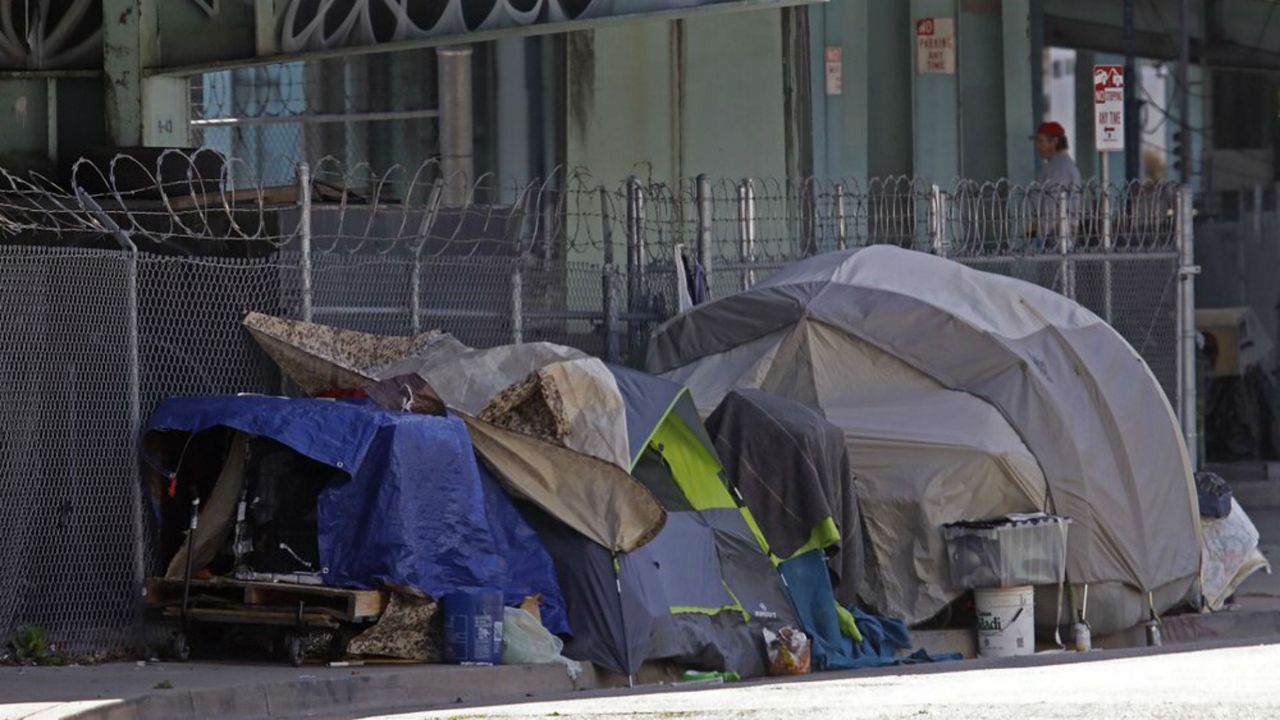LOS ANGELES – A federal judge issued a preliminary order requiring that thousands of homeless people living in encampments under Los Angeles freeway overpasses and underpasses, and near entrance and exit ramps, be relocated for health and safety reasons.
The extraordinary legal action will be enforced starting at noon next Friday, unless an alternative plan is accepted, according to U.S. District Judge David Carter, who expressed confidence the order would withstand any legal challenges.
"Those who live under and around freeway overpasses and underpasses are exposed to severely heightened public health risks as a result of where they live,'' Carter wrote in the order filed in Los Angeles federal court. "It is unreasonably dangerous for humans to live in areas that may, for example, be contaminated with lead or other carcinogenic substances,'' his order says. "However, as with many issues involving individuals experiencing homelessness, no party appears to be addressing this problem with any urgency. The court hereby ORDERS that this subset of individuals experiencing homelessness be relocated away from freeway overpasses, underpasses, and ramps.''
About 59,000 people are homeless in Los Angeles County, and roughly 6,000 to 7,000 of them live near freeway overpasses, underpasses and ramps, according to the Los Angeles Homeless Services Authority.
The judge wrote that when the homeless are exposed to such dangers as toxic fumes, hazardous waste concentrations of lead, car crashes and the potential collapse of an overpass in an earthquake, "their health is threatened in a way that monetary damages cannot adequately compensate. Additionally, homeless persons living near freeways need not suffer these harms
at all -- or, at least, need not suffer them any further -- and this outcome could be achieved with a preliminary injunction.''
"Because of the public health risks inherent in living near freeways, the court finds that the homeless individuals that live in such locations face a likelihood of irreparable harm, justifying a preliminary injunction.'' The judge added that the city and county "would only need to invest relatively modest financial and administrative resources to provide safe and healthy shelters to these individuals. As such, the court finds that the balance of the equities weighs in favor of an injunction.''
Carter indicated that before the relocation process begins, the homeless should receive advance notice of the action and information about nearby shelters and alternative housing options. He also ordered that all homeless individuals be able to retain
possession of their belongings, whether they choose to enter a shelter or alternative housing option, or simply relocate a sufficient distance away from freeway overpasses, underpasses and ramps.
As for the shelters, the judge stated that such housing must be configured with adequate physical space to allow residents to maintain the minimum recommended social distance of 6 feet to mitigate the transmission of the coronavirus.
Additionally, all shelters and alternative housing must have adequate hygiene facilities, such as handwashing stations and showers, and nursing staff who, upon intake, can test each person for communicable diseases and other health conditions, according to the order.
Carter made clear that all shelters and alternative housing options "must be staffed by security as necessary to ensure the safety of the homeless persons sheltered therein.''
Finally, after adequate notice is given, and after the city and county provide adequate alternative shelter for those living adjacent to a freeway, law enforcement will be allowed to enforce anti-camping laws to ensure the homeless are moved to a safer location.
Although the health risks constitute "an emergency and demand a swift response,'' Carter invited input from city and county officials in the week before the preliminary injunction takes effect next Friday.
Before May 22, if the parties reach an agreement on an alternative plan, they should submit their plan to the court by 3 p.m. Tuesday and a hearing will take place the next day, the judge said.
The last-minute off-site federal court hearing, which took place at the Los Angeles Homeless Services Authority, was placed on the court docket after regular business hours Thursday. The landmark ruling stems from efforts to settle a lawsuit seeking to quickly house thousands of people in danger of contracting COVID-19 while living on the streets of downtown Los Angeles.
Carter said at a previous hearing that the proposed order should not be seen as a "forced displacement,'' and stressed that it must be achieved as "humanely'' as possible.
The encampments under and around the city's freeways have long been of concern for health and safety reasons, and the question of how to handle the situation is one of the thorniest issues to come up during several months of talks stemming from the case.
Filed in March by the L.A. Alliance for Human Rights, a coalition of Skid Row-area business owners, formerly homeless and disabled city dwellers, the lawsuit accuses the city and county of Los Angeles of not doing enough to address the homeless problem downtown, especially in light of the COVID-19 pandemic.



